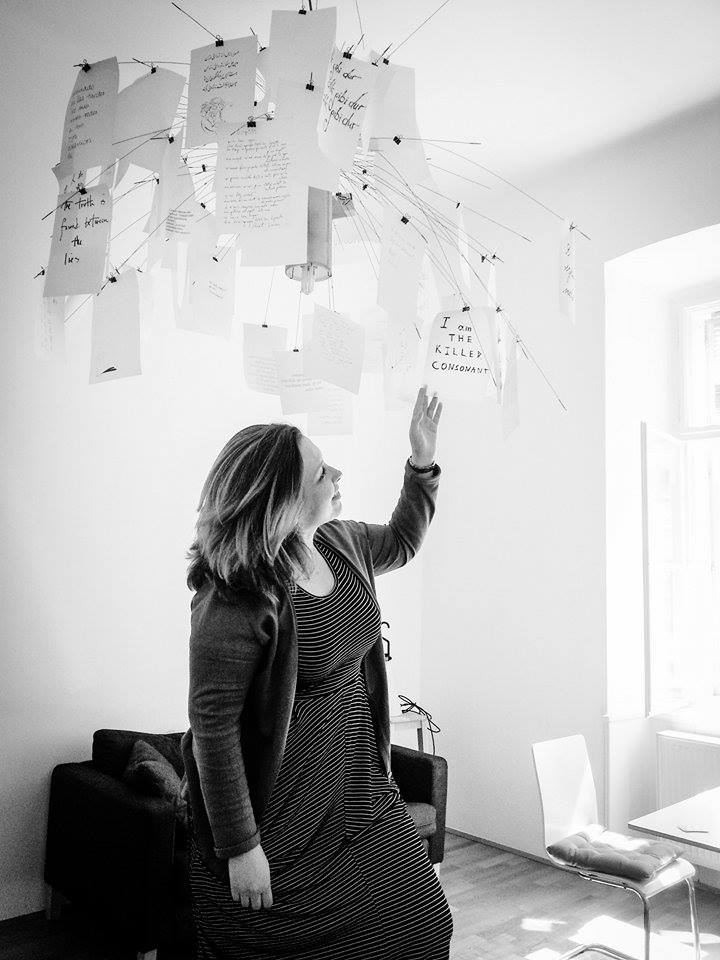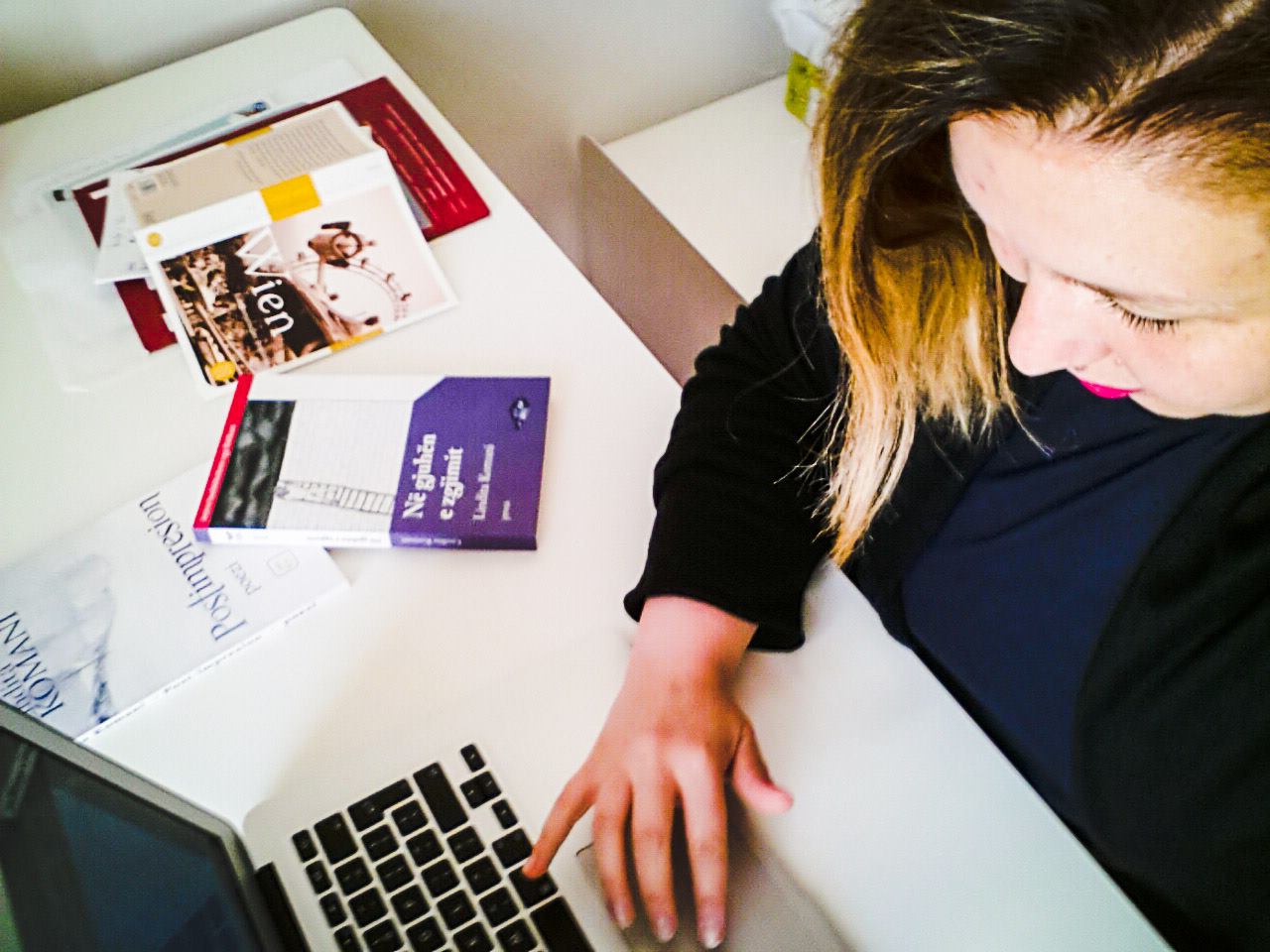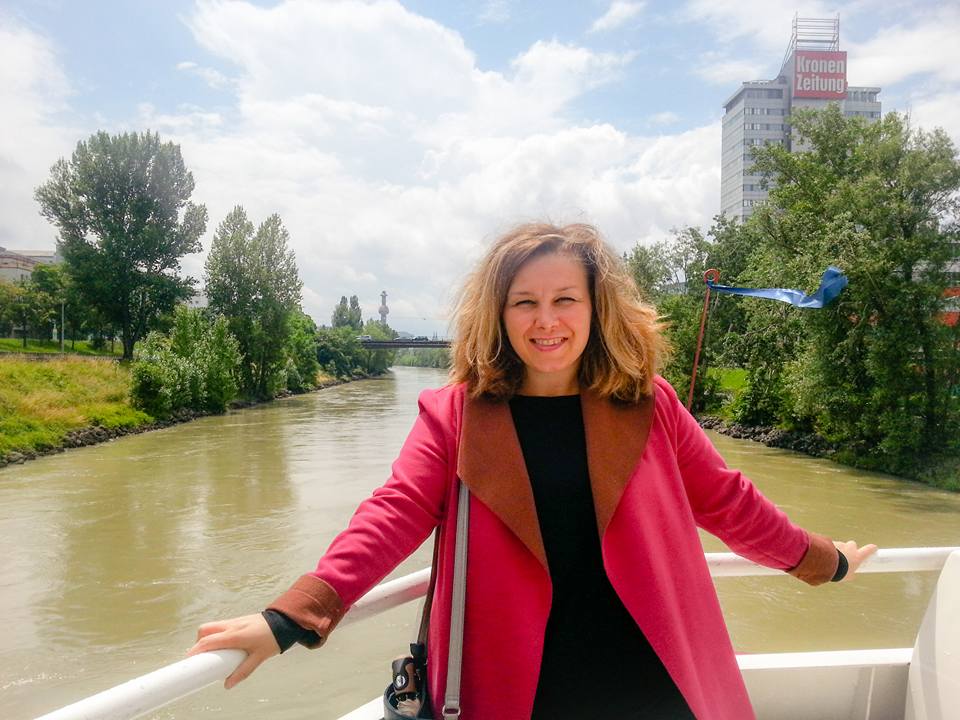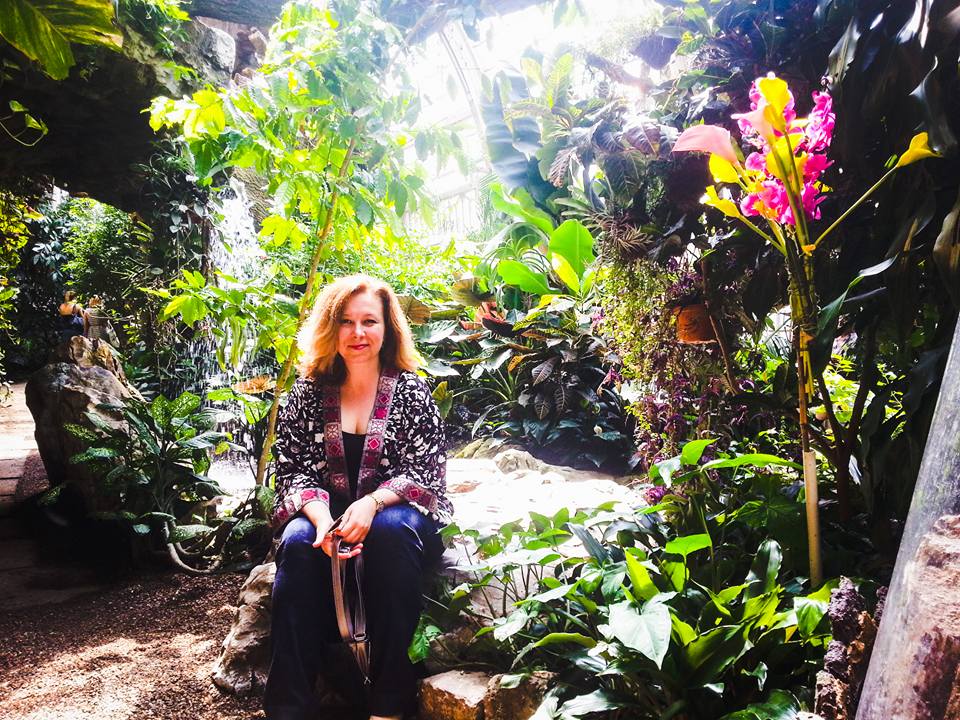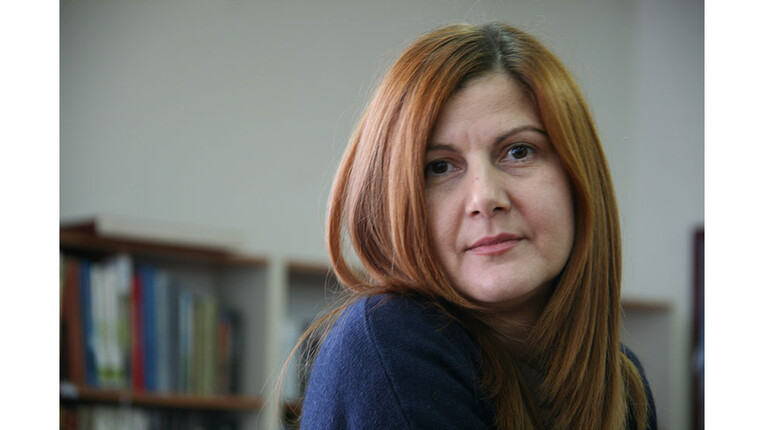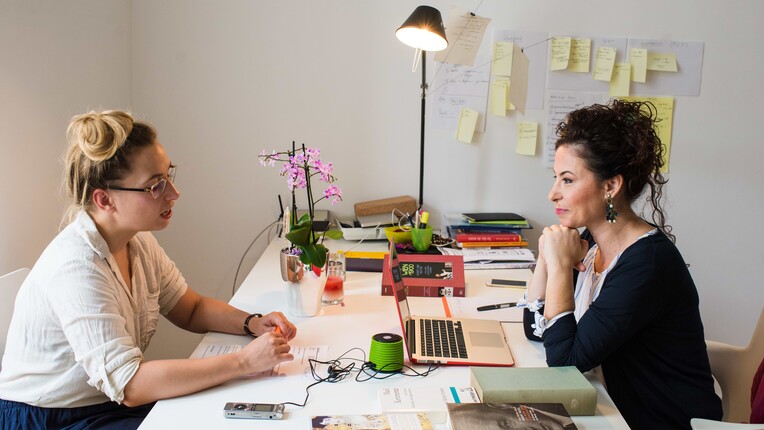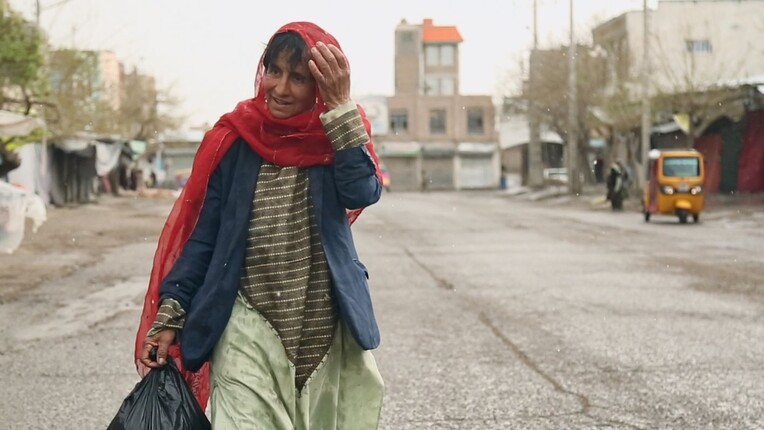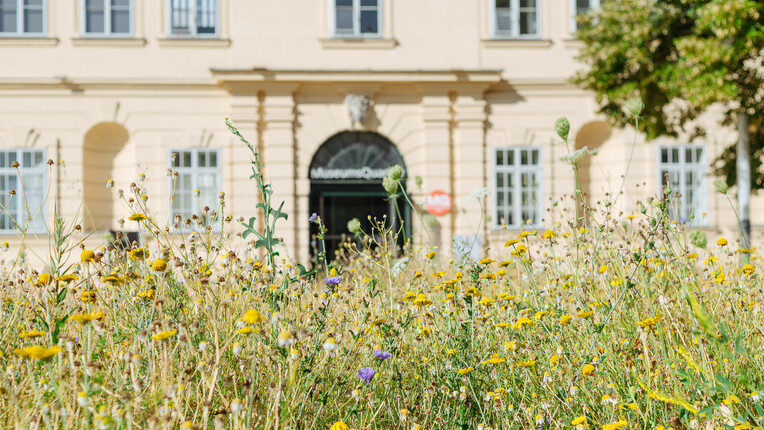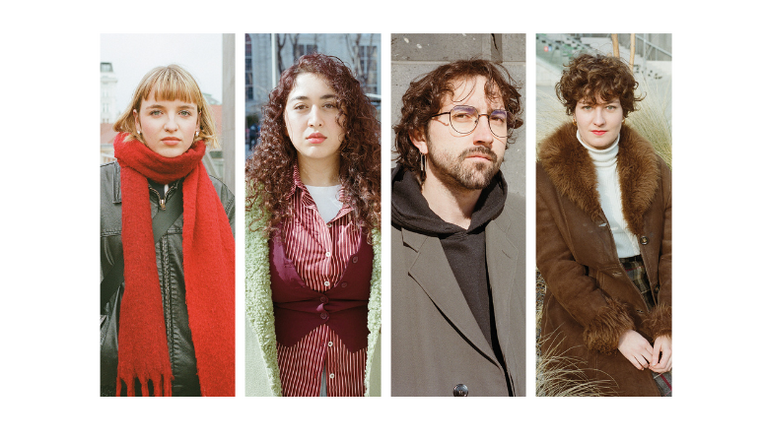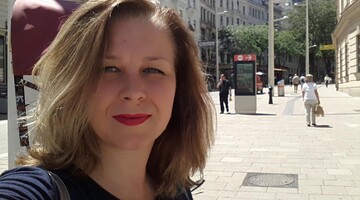
“In der Mariahilferstrasse ist die Welt los”
Lindita Komani is currently staying at MuseumsQuartier as a Writer-in-Residence, invited in cooperation with BMEIA (Federal Ministry for Europe, Integration and Foreign Affairs.)
Aside from her commercial work, she is an international writer and poet. Travelling regularly between Albania and Austria, she has settled down next to busy and inspiring Mariahilfer Straße for a month. She is working on many projects, from research at the Austrian National Archive to the observation of Vienna street life, writing about history and letting her creativity take shape as poems.
You have different types of projects you would like to realize in the next months, also while you are here, but before talking about these, I would like to know the core of your inspiration.
I speak about this topic with pleasure. I consider the ability to be inspired a key ingredient for a writer’s existence. It is a state of being which is not necessarily present all the time. But when it is present and when it keeps coming back, you have to be thankful. I am thankful.
Nature and people are what inspires me most – how they interact and how they influence, shape and even define each other. All this allows me to go from the deepest deep to the highest high in exploring, researching, studying, imagining and finally writing. And I certainly have my own way of approaching nature and people, through a mix of habitudes, as well as a quiet and steady passion for literature, and being true to myself. I’d like to mention here that my two published books “Post-impression” (poetry, 2012) and “In the Tongue of Awakening” (short prose, 2015) could be experienced as the first results of this evolving approach of mine.
In which context do you observe people and how do you turn your observations into writing?
I observe people in different contexts, for instance in extended environments, which involves interactions with other people and nature, or when they are dealing with themselves, their hopes and fears, their feelings and thoughts.
As part of one of my writing projects I am observing and studying people as individuals but also as groups within a society and/or society as a whole. I also use opportunities to travel and literary residencies abroad for this purpose. A part of the results takes the form of poetry and another part the form of prose, and there are even mixed forms which can be put on stage as a drama or a comedy, and essay-like reportage.
Reading your texts, it appears you write mainly prose and poetry, but at the moment you are preparing a new project on Albania and Kosovo which seems a bit more historical. Could you tell us more about this project and the idea behind it?
The idea for this project dates back to the time between 1998 and 2008. While I was studying in Austria, I kept following Austrian media coverage of Kosovo on its way from the protests of the 90s to the war from 1998 to 1999, up to the declaration of independence in 2008. I even kept a diary of it for my own curiosity. Back then I also wished I would have been able to follow what Austrian media had written about the independence of Albania, but that had happened a century ago. It was too late for me to experience it “live”. Now, with the help of technology, I can access the digitalised media archive of the Austrian National Library for research on Albania and, lately, especially on Kosovo. This topic is of interest for both sides, I think. Austria was a crucial supporter and enabler of the independence of Albania and one of the most important supporters of Kosovo. And it is interesting to see what the media write, as sometimes they strictly represent government policy and sometimes not, especially in times of democracy. Interestingly, from our side, the topic hasn’t yet been addressed properly yet. This project could change this and I am looking forward to the work ahead and its results. The project will hopefully end in a non-fiction publication, composed of two parts: one dedicated to Albania and the other to Kosovo. I expect this research will lead me to new characters and stories I can use for further fiction writing.
Aside from this major project, are you also working on shorter projects while you are staying in Vienna?
My observations here have already led me to new characters to be used for a prose project named “Neighbours”. It deals with neighbours on different levels, from neighbours of the same building to neighbourhood, city, state and neighbouring countries in times of peace and war. I also aim to write essay-like reportages on Vienna and Austria which are to be included in another ongoing project called “Felix Europa”. Last but not least, I am also using my time at the Austrian National Library to do research on one of the most important Albanologists of the past century, Croatian scientist Milan Šufflay.
Have you already written something about Vienna that you would like to share with us?
Yes, a few things already. I would like to share a poem I wrote after my observations of the environment, the people and life on Mariahilfer Straße. My studio has a view over this seemingly crucial street of Vienna. The poem is written in both German and Albanian and I would like to provide both versions in order to give the audience of Q21 a sense of my mother tongue.
In der Mariahilferstrasse ist die Welt los
(13 Erinnerungen aus meinem Fenster mit Blick)
Wenn die Sinne nicht mehr reichen
und die Neugier nach außen will,
führe sie…
In die Mariahilferstrasse hin.
Entdecke hier die Welt und mehr…
1.
Ich sammele Augenblicke, Bruchteile der Wahrheit, Hilferufe, Überreste.
Und du?
Jemand dreht durch.
Spricht zu der Luft in hohen Tönen.
Jede Stadt hat ihre zu der Luft sprechenden Menschen.
Das sind aber die ungefährlichsten.
2.
Sie ziehen den Hass auf sich…
Superwoman blieb unauffällig
bis die Flüchtlinge zu hier fanden.
Samt ihrer Band war es ihr nicht mehr gleichgültig
und so war es aus mit der Unauffälligkeit.
Sie spielen seitdem auf der Trommel
und die Erde trommelt genauso wie ihr Herz:
“No Border, no Nation, no Deportation!”
3.
Ich glaube dass es noch Hoffnung gibt…
Ein Kind singt. Der Vater singt mit.
Das Kind leckt an seinem Eis, wackelt und trägt die Hand des Vaters.
Lateinamerika singt und ihre Kinder hoffen auf Barmherzigkeit.
Afrika tanzt und ihre Kinder hoffen auf Barmherzigkeit.
4.
Ich bin verwirrt…
Osteuropa tanzt halbnackt
einen unverständlichen Mix
aus verrücktem Flamenco und arabischem Bauchtanz.
Italien jongliert mit neuer Pastasauce, komponiert aus neuen Tricks.
Musizierend auf einer Ziehharmonika nicken zwei Pferdeköpfe.
Niemand nickt zurück.
Die Indier im Anzug und Turban
und die Indierinnen in Sari leisten sich ein Sonnenbad.
Eifrige Touristen warten auf eine Fotoshooting Session
bei den roten Statuen von sich biegenden Männern.
Sie schauen aus als wären sie aus dem fernen Osten
und dienen als Türsteher für einen Mischmaschladen.
5.
Ich freue mich…
Im zuversichtlichen Schritt geht der verrostete Türaufmacher,
samt der ganzen Aufrüstung an Schlüsseln und Schlössern.
Zu einem Herzen, einem Schatz, einer Höhle?
Die Luft pflegt die Finger auf den Geigen.
Das Jugendorchester bereitet sich auf die Gegenwart.
Ein Arzt ohne Grenzen spielt auf Klavier.
Wirst Du zur Loslösung von Grenzen beitragen?
Die liegend Schreiende erwachte als freie Frau
und tut das kund.
Barfuß folgt ihr der schlagende Mann,
besoffen und müde spielend
vor dem ungewollten Publikum.
6.
Ich lausche…
‘Ich bin eine Mutter, Mensch.
Deine Frau ja, aber eine Mutter zuerst.
Kapierst du es?’
Und da sind sie später.
Im Innenhof
Hand in Hand, gehend, bleibend, sitzend, küssend.
7.
Ich sehe…
Die Kopftuch tragenden Schönheiten machen sich Zara
zum neuen Heim.
Sie schauen den Männern zu.
8.
Ich zähle nach…
Den Onkel McDonald aus Amerika trifft man zweimal
der Strasse entlang und er hat Gesellschaft.
KFC, Pizza, Kebap sind noch da.
Wer ist wohl Freund, wer Feind?
9.
Ich zähle weiter nach…
Und so stürmen die Geschäfstafeln
auf das Gedächtnis,
samt den Farben und den Namen und der Frage:
ein Quadratmeter kostet hier wieviel?
10.
Ich spüre…
Weingläser bereit zum Anstoßen.
Kaffeebestellungen auf den Zungenspitzen.
Und Männerblicke auf die herrlichen Beine der Minderjährigen.
11.
Ich vergleiche…
Ein Mann im schottischen Rock und ein Jugendlicher in Frauenhalstuch
und Rosa gefärbten Lippen
haben wenig mit einander zu tun.
12.
Ich erreiche mein Ziel…
Und auf einmal bin ich erstaunt.
Der Westbahnhof grüßt mich mit einem ‘çuf çuf’ in meiner Sprache.
Ich drehe mich 360 Grad um meine Achse, die wiederholt den Teufel erschrocken hat.
Die Erinnerungen sind da, von der Welt, als sie nicht in Ordnung, aber doch etwas besser als heute war.
13.
An meiner dreizehnten Erinnerung ging meine Uhr um einen Weltkrieg zurück.
Junge Menschen, die so österreichisch wie es nur möglich ist, ausschauen,
bringen Licht und mobilisieren Gedanken in den Köpfen
der Vorbeigehenden,
der Polizei.
Gedruckt auf ihren gelben T-Shirts,
genäht auf ihren mutigen Gestalten,
gewachsen in ihren Mündern:
Nazis Raus!
Wien, Juni 2016
Albanisch
Në rrugën Mariahilfer ndodh bota e tërë
(13 kujtime nga dritarja ime me pamje të mirë)
Nëse shqisat nuk mjaftojnë më
dhe kureshtja kërkon të dalë jashtë,
drejtoje atë…
Për në rrugën Mariahilfer.
Zbulo këtu botën e më shumë…
1.
Unë mbledh çaste, pjesëza të së vërtetës, thirrje për ndihmë, mbetje.
Po ti?
Dikujt i ikën mendja.
I flet ajrit në tone të larta.
Çdo qytet ka njerëzit e vet që i flasin ajrit.
Por, këta janë më të parrezikshmit.
2.
Ata tërheqin urrejtjen mbi vete…
Superwoman mbeti e padukshme
deri kur refugjatët e gjetën rrugën për këtu.
Bashkë me grupin e saj muzikor ajo nuk qëndroi më neutrale
e me këtë mbaroi edhe mosrënia në sy.
Prej aty grupi luan në daulle
dhe daullja e tokës bie sikurse dhe zemra e saj:
“No Border, no Nation, no Deportation!”
3.
Besoj që ende ka shpresë…
Një fëmijë këndon. Babai këndon me të.
Fëmija lëpin akulloren, lëkundet dhe mban dorën e babait.
Amerika Latine këndon dhe fëmijët e saj shpresojnë në bamirësi.
Afrika kërcen dhe fëmijët e saj shpresojnë në bamirësi.
4.
Jam konfuze…
Europa Lindore kërcen gjysmëlakuriq
një miks të pakuptueshëm të përbërë nga
Flamenko e çmendur dhe kërcim arabik me barkun jashtë.
Italia xhonglon me salcë të re makaronash, kompozuar me trike të reja.
Duke bërë muzikë në fizarmonikë dy koka kuajsh përkulen.
Askush nuk ua kthen përshëndetjen.
Indianët në kostum dhe turban
dhe indianet në sari i lejojnë vetes një banjo dielli.
Turistë të dëshiruar presin për një sesion fotosh
tek statujat e kuqe të burrave që përkulen.
Ata duken si nga Lindja e Largët
dhe shërbejnë si roje në hyrje të një dyqani mishmashi.
5.
Gëzohem…
Me hap optimist ecën hapësi i ndryshkur i dyerve,
bashkë me arsenalin e tij të plotë me çelësa dhe brava.
Drejt një zemre, një thesari, një guve?
Ajri kujdeset për gishtat mbi violina.
Orkestra e të rinjve përgatitet për të tashmen.
Një mjek pa kufij luan në piano.
Do të marrësh ti pjesë në shpërbërjen e kufijve?
Gruaja që shtrirë bërtiste, u zgjua si grua e lirë
dhe e bën me dije këtë.
Zbathur e ndjek burri që e godet,
i dehur dhe duke luajtur të lodhurin
para publikut të padëshiruar.
6.
Përgjoj…
“Jam nënë, o njeri.
Gruaja jote po, por fillimisht nënë.
A e kupton këtë?”
Dhe ja ku shihen më vonë.
Në kopshtin e brendshëm
dorë me dorë, në ecje, tek qëndrojnë, të ulur, duke u puthur.
7.
Shoh…
Bukuroshet që mbajnë shami në kokë e kthejnë shitoren Zara
në shtëpinë e tyre.
Ato shohin burrat.
8.
Numëroj…
Xhaxhanë McDonald nga Amerika e takon dy herë
përgjatë rrugës dhe ai ka shoqëri.
KFC, Pizza, Kebap, ndodhen po ashtu këtu.
Kush prej tyre është mik, kush armik?
9.
Numëroj më tej…
Dhe kështu lëshohen në sulm tabelat e shitoreve
në kujtesë,
bashkë me ngjyrat dhe emrat dhe pyetjen:
sa kushton një metër katror këtu?
10.
Ndjej…
Gota vere gati për dolli e cakitje.
Porosi kafeje në majë të gjuhës.
Dhe vështrimet e burrave mbi këmbët e bukura të të miturave.
11.
Krahasoj…
Një burrë në fund skocez dhe një djalë i ri me shall gruaje
dhe buzë të lyera në ngjyrë rozë
kanë pak të bëjnë me njëri-tjetrin.
12.
Arrij qëllimin tim…
Dhe befas jam e mahnitur.
Stacioni Perëndimor i Trenit më përshëndet me një “çuf çuf” në gjuhën time.
Rrotullohem 360 gradë rreth aksit tim që në mënyrë të përsëritur ka trembur Djallin.
Kujtimet janë aty, nga bota, kur ajo nuk ishte në rregull, por gjithsesi pak më mirë se sot.
13.
Në kujtimin tim të trembëdhjetë, ora ime kthehet një Luftë Botërore më herët.
Njerëz të rinj në moshë që duken aq shumë austriakë sa është e mundur,
sjellin dritë dhe mobilizojnë mendimet në kokat
e kalimtarëve
e policisë.
Shtypur në t-shërtet e tyre
qëndisur në trajtat e tyre
rritur në gojët e tyre:
“Nazistët Jashtë!”
Vjenë, Qershor 2016
Interview: Mathilde Panneau
Fotos: Lindita Komani
